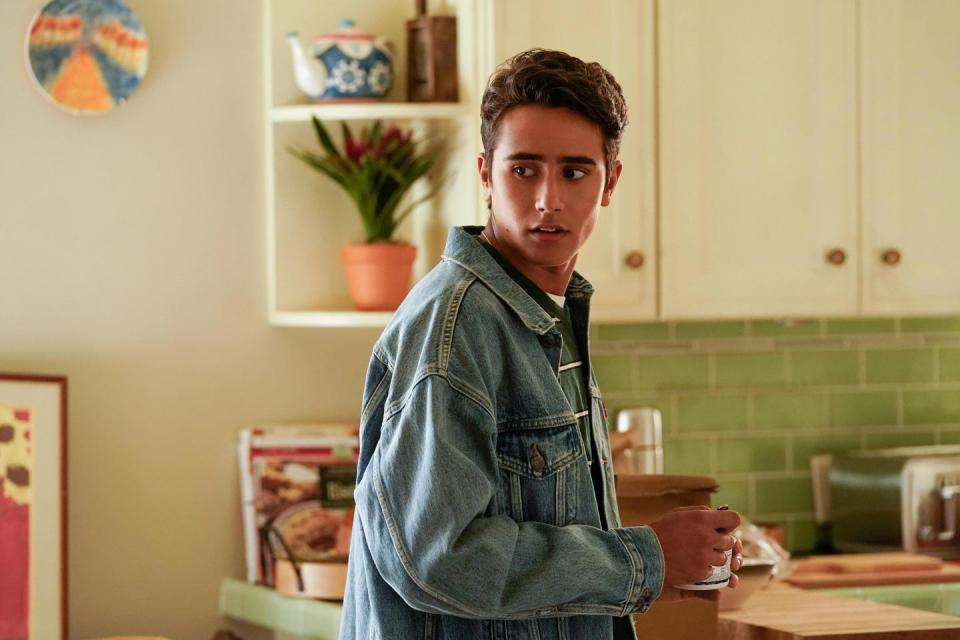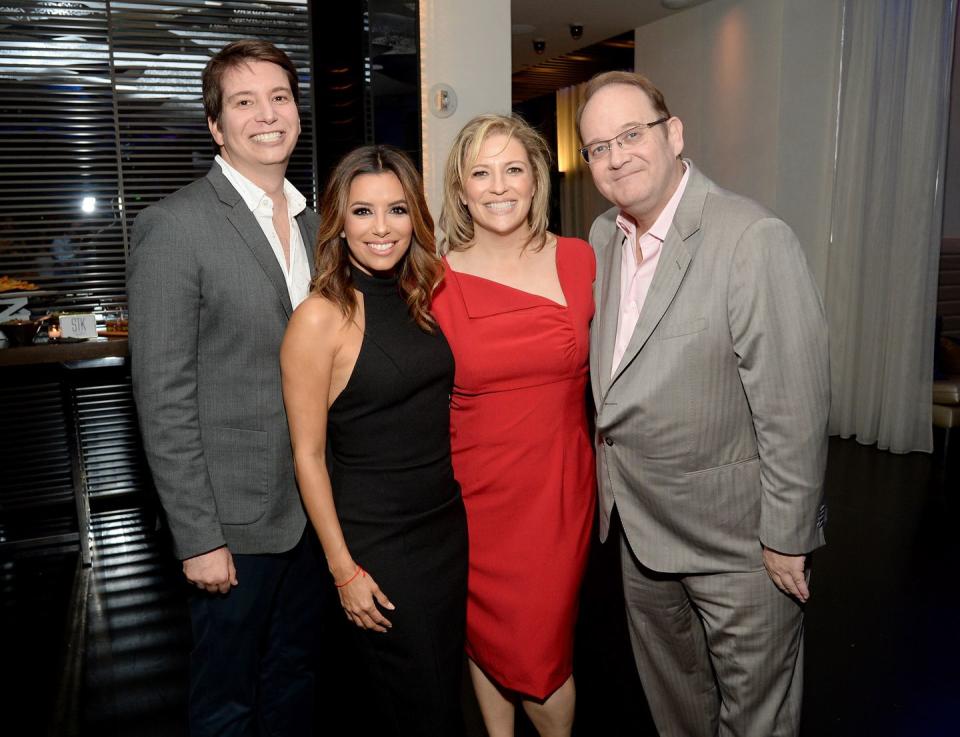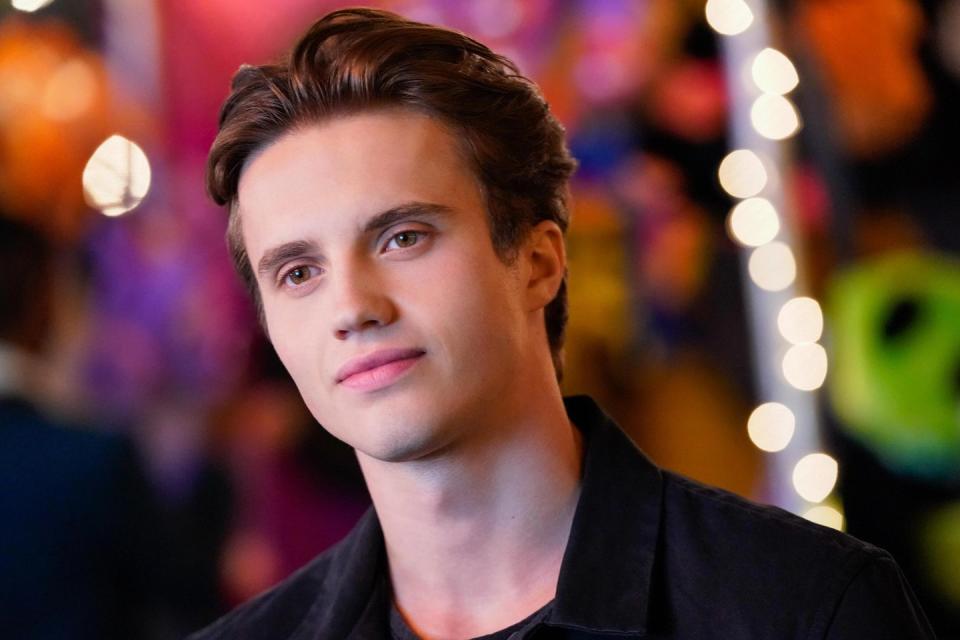Love, Victor showrunner explains why move from Disney+ to Hulu is "a great opportunity"

Rainbow Crew is an ongoing series which celebrates the best LGBTQ+ representation on TV. Each interview showcases talent working on both sides of the camera, including queer creatives and allies to the community.
Today we're speaking to Brian Tanen, a TV veteran who works on Love, Victor as executive producer and co-showrunner.
What do Ugly Betty, Devious Maids, and Desperate Housewives have in common? Well, they're each addictive in the best way possible, but that's not all. In a world where white, straight, male-centric stories still dominate, each of these shows have also expanded our definition of mainstream TV, prioritising characters we still don't see enough on our screens.
It's also no coincidence that Brian Tanen worked extensively on each one of these shows. Along with his collaborators, Tanen has written and produced a huge number of stories that champion people from all different backgrounds, often with a queer twist.

Since Grand Hotel closed its doors last year, Tanen has now turned his attention to Love, Victor, a Love, Simon spin-off which strives to tell "a more complicated, nuanced" love story. Together, we spoke about these comparisons, the importance of authenticity, and why the move from Disney Plus to Hulu is "a great opportunity" for Love, Victor.
Congratulations on Love, Victor! Love, Simon fans have been eagerly anticipating this show for a while. Was there a lot of pressure to live up to the film's legacy?
Yes! I think the film meant a lot to a lot of people, especially within the LGBTQ community. But the creators of the show are the writers of the film. That's Isaac Aptaker and Elizabeth Berger. They approached this project with a great deal of reverence for both the original source material of Becky Albertalli's book, as well as the film that they wrote.
A post shared by @ briantanen on Mar 26, 2020 at 9:32am PDT
I came to the project after the film. I had just been a fan, but when they pitched the show to me, I thought it was such a smart way to continue the story – to tell a different coming out story that was a totally different experience from Simon's.
From the very first episode, it feels like Love, Victor sets out to prove exactly that. By rejecting Simon's experience, the show frees itself up to explore a non-white coming out experience with religious undertones.
The film was so wonderful because it represented this wish fulfilment, this idea that you can have a teenage romantic comedy – like so many you've seen before – but this time the narrative was centred around a gay teenager.
Because it's a movie, you kind of want that happy ending. You want everything wrapped up in a bow by the end of the two hours. But with television, you can tell a story over a long period of time, over not only a season, but hopefully many seasons.
Right from the beginning, we wanted to tell a different story from Simon, one where Victor isn't at the same place Simon was on his journey. Victor hasn't even said the word "gay" out loud to himself. He suspects that he may be different but in the way that a lot of LGBTQ+ teenagers do at that age. You may suspect it, but society at large has told you that the normal way to be is to like girls, and you don't want to let your family down. So you try things along the way to not be LGBTQ+.
So, yes, this is a more complicated journey for our character. And one of the major complications is that his family is not the same as Simon's.

They're religious. They have more conservative values. But in no way does the show try to villainise them. They're incredibly warm people who love their children and want what's best for them. They just have different expectations and different ideas of what their son's life is going to be.
Love, Victor is also more mature than Love, Simon, particularly when it comes to discussions around sex and drugs. Could you shed some light on why the show moved from Disney+ to Hulu, and if this played a factor in that decision?
I think a lot of people don't realise that Hulu is a Disney brand. Moving the show was a decision made not by me, but within the company, who decided that this network would be the best home for the show.
For me, it's a great opportunity. I'm thrilled that we're on Hulu because we want the show to have a very long life. As we progress into future seasons, and as our teenagers grow up, these things that make up the fabric of teenage life – including adult and sexual experiences – are just going to be easier to tell on a more adult network like Hulu.
All too often, queer kisses and relationships are just teased on screen, but these things are just a natural part of Love, Victor's DNA.
In the writers' room, we discussed how one of the biggest problems with LGBTQ+ characters in TV and film is they're almost always neutered. They can be the funny sidekick, they can be the best friend, but you rarely see the narrative centre around a gay character having crushes and sexual feelings and sexual experiences.
Part of being gay is that experience. It's a sexuality, and part of sexuality includes sex. We didn't want these to just be chaste crushes. We wanted this character to be a red-blooded American teenager who has these kind of feelings, and eventually will want to act on them.
For the longevity of the show, we just felt that an authentic story would include what you're describing: kisses, and, eventually, in future seasons, even more.
What did it mean to you personally to have such a big input on this show?
Love, Simon was a meaningful film to me, and I would have kicked myself if I didn't get to have a hand in the telling of the TV show. And the writers' room was filled with LGBTQ+ writers, as well as just a racially diverse group of writers, specifically skewing Latinx, that could bring authenticity to these stories.

That kind of authenticity is important, which is why some fans were disappointed to learn that a straight actor (Michael Cimino) would play Victor. This all ties into an ongoing debate around authenticity and whether queer actors should always be the ones who play queer roles. What are your thoughts on that?
I feel like representing LGBTQ+ actors in front of the camera is super important. It's something that I'm a champion of. You can see it throughout the show, both in front of and behind the camera. There are a number of LGBTQ+ actors, especially in episode eight, where Victor meets an older subset of college kids.
I totally understand the question about whether gay actors should only play gay roles. I think we're excited about the opportunity to continue offering opportunities to LGBT actors, crew, directors, and writers. And the longer we have a life for the show, the more and more we can do that.
How is it different now, writing queer representation on Love, Victor compared to earlier shows like Desperate Housewives?
I've had the really good fortune of working on shows that are always very inclusive. My first job in television was working on Ugly Betty, which had queer characters and a trans storyline before that was more commonplace, as well as a number of LGBTQ+ writers on the show, and a gay showrunner.

And then there's Desperate Housewives, which was created by Marc Cherry, a gay creator and showrunner. So I've been very fortunate in that these rooms were all incredibly gay-friendly, and wanted to tell gay stories.
I think for Love, Victor, the challenge was writing for teenagers. We're not a roomful of teenagers. Although a number of the writers were gay, our experiences from however many years ago are not the same as the ones teenagers are experiencing now. It's heartening to know that teenagers today are living in a world that's more inclusive of LGBTQ+ people. But these are still important stories to tell.
We talked to three separate groups of teenagers in high schools about what it's like to be a queer teenager today, some of whom were from gay-straight alliance clubs at their schools. Is it still a big deal? Or in 2020, do people go, "Great! Good for you."
The answer was: it's complicated. In some instances, the school was pretty liberal, but the further you got out from Los Angeles and even just, you know, 45 minutes away – there were schools where there were no out teenagers, and there had never been a gay couple at a prom. And while there wasn't overt bullying like there might have been decades ago, it still would be considered socially problematic to be gay.

So that was another reason we felt it was really important to represent a coming out story where things were not quite so easy.
What are you most proud of when it comes to your involvement with Love, Victor?
I think a lot about myself at the age that Victor is, when I was a teenager in high school. Even then, the topic of LGBTQ+ stuff was so frightening to me. I was so engulfed in my own fear. I wanted to run away from it because I wasn't comfortable with myself.
When this opportunity to work on Love, Victor came up, I thought to myself how my perspective had shifted over the years – that now, to work on a gay project, was singlehandedly the most exciting career opportunity for me, because I wanted to be part of that conversation.
I think that's one of the messages I would offer to LGBTQ+ youth who are struggling with these issues. There was a time when I was a teenager that I was so afraid of these things and it would prevent me from having a – quote – "normal" life.
And in retrospect, every wonderful thing in my life – my friends, my relationships with my family, my partner, and the wonderful life we have – it's all been made possible by the fact that I'm gay. All the best parts of my life are from embracing this identity.
So, I'm proud to work on a show that shares this message.
Love, Victor season one is now available to watch in the US on Hulu. A UK broadcaster is yet to be announced.
Digital Spy now has a newsletter – sign up to get it sent straight to your inbox.
Looking for more TV recommendations and discussion? Head over to our Facebook Group to see new picks every day, and chat with other readers about what they're watching right now.
You Might Also Like

 Yahoo News
Yahoo News 
